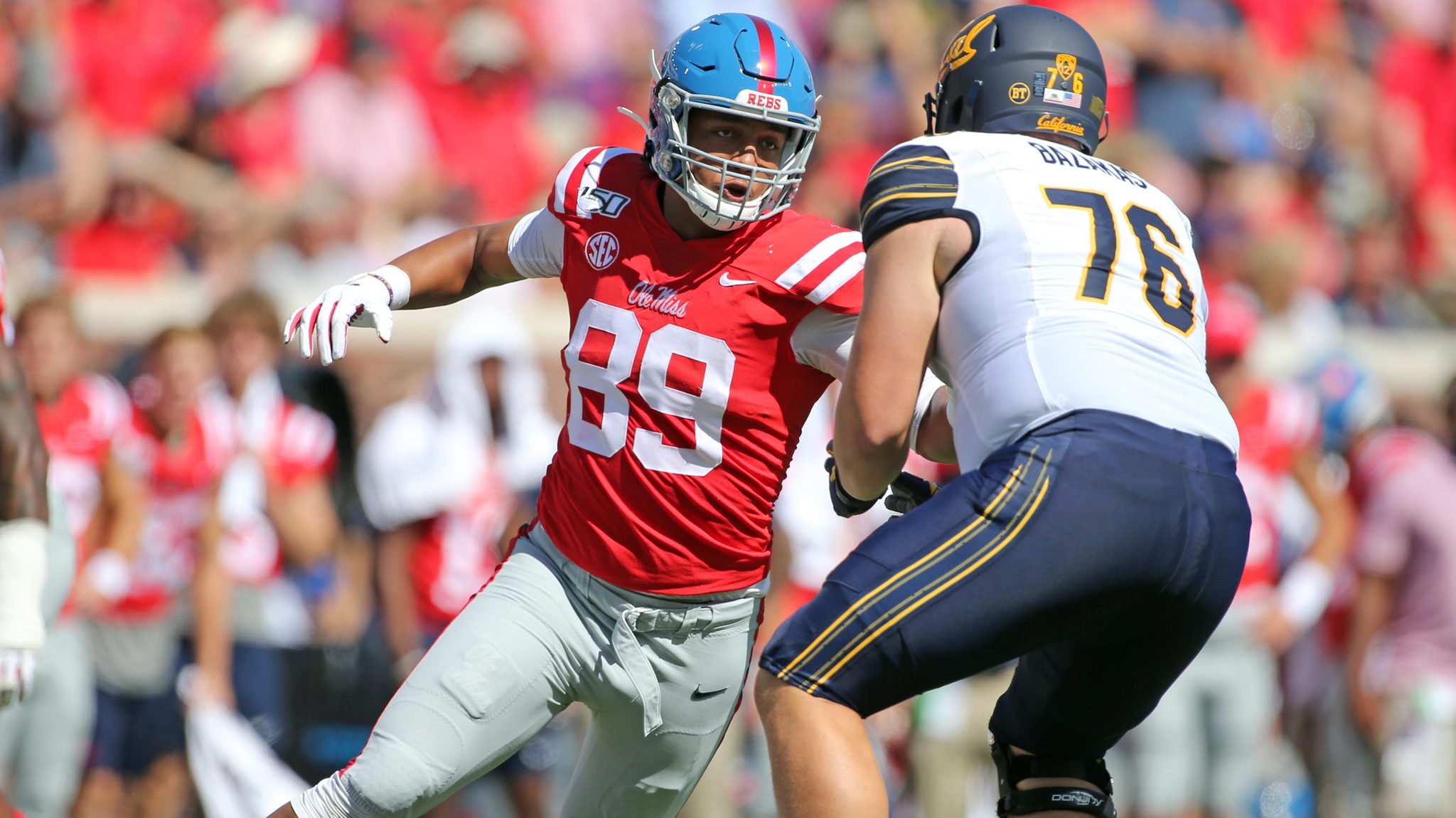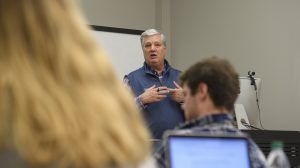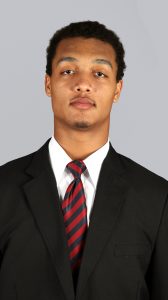
Ryder Anderson, a senior defensive end for the Ole Miss Rebels, was well-acquainted with how athletes prepare for a big game, but he did not know about all the preparation required behind the scenes to make athletic events happen until he took Scott Pederson’s IMC 584: Collegiate Sports Promotion course during winter intersession. Photo by Petre Thomas/Ole Miss Athletics
OXFORD, Miss. – When Ryder Anderson takes the field most Saturdays in the fall at Vaught-Hemingway Stadium – in front of more than 60,000 cheering fans – the Rebel defensive end is calm because he’s been preparing for that moment most of his life.
What he never took into account – at least not until this past winter intersession – is just how many behind-the-scenes professionals also have been preparing their whole lives to make that day happen.
As part of his IMC 584: Collegiate Sports Promotion class at the University of Mississippi, Anderson, a senior from Katy, Texas, spent time with some of the university’s, and the nation’s, leading sports professionals. They taught him about everything that goes into a sporting event aside from the game itself – from the vendor contracts and facilities budgets to the legal and creative teams.
“No one else is doing anything like this in the nation,” said Will Norton, dean of the School of Journalism and New Media.
The course is the brainchild of sports-promotions expert and adjunct professor Scott Pederson, who brings his contacts into the classroom each day for two weeks to show students all the different ways they can use their varying passions inside the expansive world of sports.
And Pederson knows the ins and outs of the sports world, having served as Jimmy Johnson’s recruiting director at Oklahoma State University, director of marketing for the Kansas City Royals, a representative of Miller Sports, an NFL advertising sponsor and a brand advocate for Nike and Live Strong. He’s helped plan some of the biggest events in sports, including a World Series.
Uncovering a New Professional World

Sports promotion expert Scott Pederson, an adjunct instructor in the UM School of Journalism and New Media, talks to students in his IMC 584: Collegiate Sports Promotion class in Farley Hall. Photo by Thomas Graning/Ole Miss Digital Imaging Services
The one-of-a-kind class teaches marketing and accounting students about the careers they hope to pursue, but through the surprisingly relevant lens of collegiate sports. At the same time, it unveils a whole new world of professional options most students have never considered. While high-level athletic competitions are a daily reality for some students, few are presented with professional sports as a career option.
“Scott knows everyone in the sports world because he’s been in it for so long,” Norton said. “He’s been a recruiter. He’s planned a World Series. He’s worked with Nike. He’s done it all.”
Many of his students, like Victoria Johnson Abshire, a graduate accounting student from Beaumont, Texas, never realized the amount of need this $500+ billion industry has for people with her business skillset.
“It exposed a different side of accounting, and the business world too, that I feel like, as accounting students, we don’t get to see,” Abshire said. “It was cool to see all the speakers in the class and hear about what they do.
“I’m a tax person, so thinking of the tax implications of a lot of the things the speakers talked about – even though it wasn’t necessarily a topic in class – was something that sparked my interest.”
During his annual winter intersession course, Pederson brings a big name from the world of sports into each of the class’ 10 meetings, whether in person or through video conferencing technology. One class featured Atlanta Sports Council President Dan Corso, who helped bring the College Football Playoff National Championship, Super Bowl LIII and NCAA Final Four to Atlanta. Another class featured Kyle Campbell, Ole Miss associate athletics director for communications.
“Talking to Kyle Campbell about the marketing communications aspect of everything was cool,” Anderson said. “He’s literally seen it all and he talked about that.
“I’ve thought about how everything comes together on a game day before, but it was nothing like I imagined. It was interesting to see all that – especially in talking to Paris (Buchanan, associate director for marketing and fan experience) and Kyle (Campbell). I wasn’t aware of how much goes into it.”
Anderson said this class has given him insight into the many different areas of sports marketing he can pursue. He hopes to work as a marketing specialist for a professional team when his football career ends.
Pederson’s idea for the class was born out of his desire to expose students who are interested in sports to the many career opportunities the industry offers.
“Most kids, when they think they want to get a job in sports, either want to play, be a sports agent or they want to be an athletic director,” Pederson said. “It’s like these are the only things they know to think about doing.
“But, don’t you think this $117 million budget that the athletic department is responsible for has some accountants trying to figure it out?”
The course, which began as a general sports promotions class, has evolved to focus on collegiate sports because of students’ interest in and ability to relate to the athletic events happening around them every day.
Each student is given a controversial topic at the beginning of the intersession and charged with the responsibility of researching and leading a discussion around it.
On the day of the national championship game, students led a discussion around the College Football Playoffs. Some advocated for a longer playoff, arguing increased marketing dollars would benefit the schools involved and include smaller schools. Others said the current schedule already places a strain on student-athletes.
The discussion was made more interesting by having a student-athlete in the room taking the course.
The discussions are lively because the students are engaged – and it all comes back to Pederson’s passion for students, connecting people and sharing the overlooked stories in the world of sports.
A Partnership Long in the Making
As compelling as the content of the class may be, the way it came to be is nearly as interesting.
While serving as dean of the College of Journalism and Mass Communications at the University of Nebraska, Norton became familiar with Pederson’s father, former Nebraska state Sen. Don Pederson, and brother, Steve Pederson, who served as the university’s athletic director for five years. During that time, Scott Pederson would make time to speak to Norton’s students while visiting his brother.
It was the elder Pederson who prompted Scott Pederson’s daughter, Ashlyn, to connect with Norton.
“He realized she’s my daughter, and she realized he was someone who knew our family,” Pederson said. “When we found that out, I would make time to speak to classes whenever I visited her.”
That’s also when Ashlyn Pederson switched her major to integrated marketing communications.
Eventually, Norton asked Pederson to teach the class that would become Collegiate Sports Promotion. For Pederson, it was an opportunity to spend time with his daughter, who planned to enroll in the winter intersession.
“I would teach and she would take a class and then we would hang out after, and it was awesome,” Pederson said. “We did it two years in a row. When she graduated, I found that I was still enjoying doing it and morphing the class into more of a collegiate focus (from its original professional sports focus).”
Pederson said the two weeks at the beginning of the year are also a pretty quiet time for most of the people he partners with through his business, Positive Athlete.
“I live in Oxford for those two weeks,” he said. “It’s quiet. I get so much planning and work done. I use it as almost a personal retreat and the students energize me. We have fun.”
The joy Pederson takes in teaching the two-week course is obvious. He smiles as he describes the class and speaks with a great deal of animation. He said most of the speakers he brings in are so willing because they all want to be in his shoes.
“You can tell Scott genuinely cares and is interested in what he’s teaching,” Abshire said of her professor. “And that made the rest of us more excited to engage.
“I was almost star-struck at some of the people he brought in, and you could tell they respected him to take the time out of their day to come to our class.”
Students and Norton alike said Pederson’s greatest objective is to make sure students leave the class with a new perspective on their field of study and, hopefully, a few new contacts that can help them begin their professional careers in the coming years.
